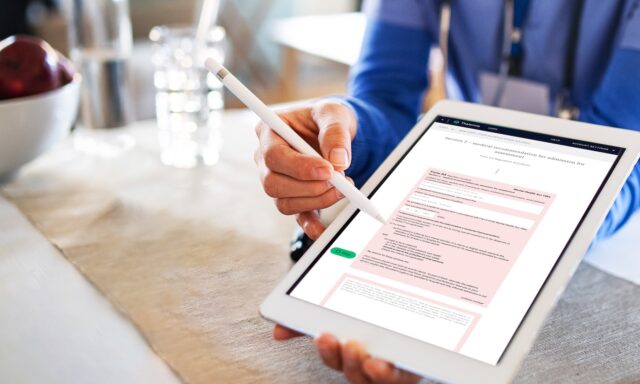
For Jan Devine, a seasoned professional and qualified expert in mental health legislation with over three decades of NHS experience, embracing digital transformation wasn’t just about keeping up with the times — it was about revolutionising Mental Health Act pathway care delivery and administration.
As the team manager overseeing the Mental Health Act for Cheshire and Wirral Partnership (CWP) NHS Foundation Trust, Devine’s role has evolved from medical secretary to leader of a complex, multifaceted team managing 400 detentions at any given time. The introduction of Thalamos software has been a game-changer for her team and for CWP, paving the way for new and efficient processes that drive high-quality care.
A timely decision
Devine vividly recalls the moment the idea of Thalamos first came onto her radar. “It was about a week before the first COVID-19 lockdown,” she remembered. “I’d seen something about it online and decided to give the Thalamos team a call from my kitchen at home. At that point, we were grappling with how to manage paper-based processes during a pandemic.”
Digitisation had been a long-standing ambition for her team, but the pandemic served as the catalyst. “We’d talked about it for years,” she said, “but it was always in the background. Suddenly, the urgency was there, and I thought, ‘Yes, this is what we need’.”
The initial decision to procure Thalamos wasn’t primarily about cost or efficiency. “For us, it was about safeguarding our patients and their rights and ensuring we worked within the law,” Devine explained. “We knew it would take time and effort upfront, but we were willing to invest that to make it happen.”
Running the trial
Devine’s team piloted Thalamos during a period of unprecedented challenges. “We implemented it on top of our day jobs, without a dedicated project manager initially,” she recalled. Despite the difficulties, the team’s collaborative spirit and commitment shone through. “We’ve always been innovative and focused on improvement. Even during the trial, we were constantly looking for ways to refine the process.”
The transition wasn’t without its sceptics. “There was a lot of apprehension,” Devine admitted. “Consultants and ward staff were used to paper processes, and there was comfort in having something physical. The key was finding champions within the Trust to alleviate those concerns.”
With the support of senior management, including the Trust’s joint medical directors, the pilot gained traction. “Their backing was crucial,” Devine emphasised. “They encouraged clinicians to come on board, which made a significant difference.”
Before and after
Reflecting on the pre-digital era, Devine paints a picture of inefficiency and physical strain. “When I was an administrator, we lived by paper and filing cabinets. At the end of each day, there’d be a massive pile of paperwork to file,” she remembered. Processes were slow, with delays caused by the need to email, scan, and post documents across the Trust.
Today, Thalamos has transformed those processes. “Everything is stored safely on our computer systems, and we’re becoming increasingly paperless,” she added. The team can now work remotely or on-site with equal efficiency. “Before, if we went out for the day, we couldn’t complete tasks until we were back in the office. Now, amendments and updates happen instantly.”
The shift has led to tangible benefits, including reduced errors and significant time savings. “We’ve seen a positive progression,” Devine noted. “There’s been a reduction in errors and less time spent driving between locations to make amendments. It’s freed up clinical time for more meaningful work.”
“It’s not just about safeguarding patient rights; it’s about creating a more efficient and responsive system for everyone involved.”
Key results from the CWP pilot study
National recognition
The success of the pilot was nationally recognised when CWP, in collaboration with Thalamos, won the Early-Stage Patient Safety Innovation of the Year award at the 2024 HSJ Patient Safety Awards. The judges commended the team for their “clear and practical approach” to addressing patient safety, highlighting the significant benefits to both staff and patients. The initiative was praised for its potential to deliver system-wide improvements and cost savings while ensuring scalability across other NHS Trusts.
This accolade underscores the importance of embracing digital innovation in mental health care. “Receiving this recognition was fantastic for morale,” Devine stated. “It’s a testament to the importance of our role and what we’ve achieved together.”
Mental Health Act reforms
These advancements align with the ongoing reforms to the Mental Health Act in England and Wales, which aim to modernise mental health care by introducing statutory care and treatment plans, reducing unnecessary detentions, and enhancing patient autonomy. Digital tools like Thalamos are poised to play a critical role in supporting these reforms by ensuring real-time access to patient information, improving crisis response, and minimising the involvement of police and prison services in mental health emergencies.
Devine highlighted the transformative impact of these changes. “The digitisation of this system has enabled patients to have ‘real-time’ access to their information and updates around the Mental Health Act, their rights, safeguards, and treatment processes,” she explained. “It’s not just about safeguarding patient rights; it’s about creating a more efficient and responsive system for everyone involved.”
As CWP continues to build on its success, the integration of Thalamos serves as a blueprint for other Trusts looking to enhance patient outcomes and operational efficiencies. “We’re already seeing interest from other teams and Trusts who want to adopt similar solutions,” Devine shared. “It’s exciting to see how this can scale and evolve.”
A message to others
The message is clear for other mental health teams considering digital transformation. “Explore it,” Devine urged. “Make sure you have a good project team in place and the right support from senior leaders. It’s vital to approach it from both management and clinical perspectives.”
To her own team, Devine offers heartfelt gratitude. “I’m so proud of what we’ve achieved together. Their support has been incredible, and this is just the beginning. We’re on a journey to create even better outcomes for our patients.”
As CWP continues to embrace the opportunities Thalamos offers, Devine and her team are not only transforming their own processes but also setting a benchmark for mental health services across the NHS. Their story is a testament to the power of innovation, collaboration, and a steadfast commitment to improving patient care.
If you’re interested in utilising eMHA by Thalamos in your organisation then book a demo or get in touch with the team to find out more.


